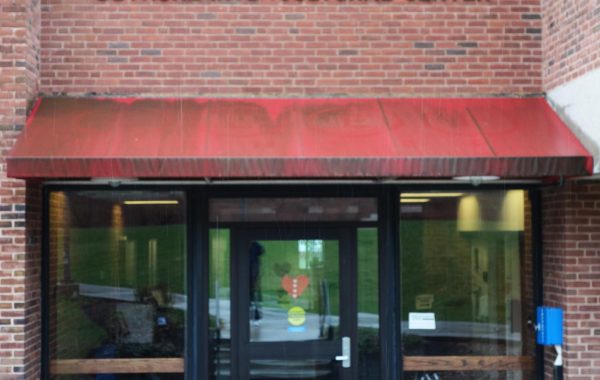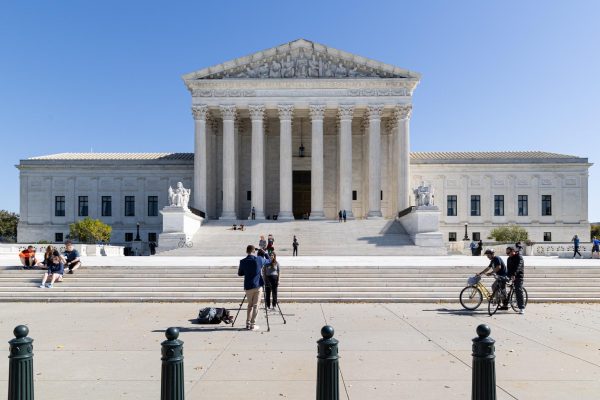Supreme Court Attempts to Control Women’s Bodies… Again
May 20, 2022
TW: sexual assault
While the richest of the rich celebrities dressed up in million-dollar outfits for the Met Gala on May 2nd, a woman’s right to control her own body was threatened yet again. Celebrities like Olivia Rodrigo, Blake Lively, Cole Sprouse, and Lizzo, dressed up for the theme “The Gilded Age”, a time period it seems we have returned to, as women are seemingly getting their rights to their own body taken away. How patriotic of us. Last week, Politico, a political journal, leaked a proposition made by the Supreme Court to vote to overturn the Roe v. Wade decision.
In 1969, Normal McCorvey of Texas found out that she was pregnant with her third child and made the decision to have an abortion. However, in the state of Texas at the time, abortions were only permitted if the mother’s life was in danger, or in the case of rape or incest. After her failed attempt to get an abortion illegally, she went to an attorney seeking help. The attorney had then referred her to two recent graduates of the University of Texas Law School, Linda Coffee and Sarah Weddington, who immediately brought a lawsuit against the Texas government. The lawyers claimed that the law had violated McCorvey’s (who, in an effort to protect her identity, went by “Jane Roe” throughout the case) constitutional rights, stating that even though her life was not in danger, Roe had every right to get an abortion safely in her home state. The U.S. District Court for the Northern District of Texas agreed that the law violated the Ninth Amendment – the right to privacy – and therefore was unconstitutional.
The decision was later taken to the Supreme Court in 1971. Texas representative, Jay Floyd, opened the case with a joke that was highly inappropriate for the matter at hand, regarding the two women resenting Roe. “Mr. Chief Justice and may it please the court. It’s an old joke, but when a man argues against two beautiful ladies like this, they are going to have the last word.” It was an offensive joke, and Floyd ended up being replaced by Attorney General Robert C. Flowers because of what the commenters called “the worst joke in legal history”. After two more court arguments, Chief Justice Blackmun announced the 7-2 decision, stating that Texas had violated Roe’s right to privacy.
Because of the court’s ruling, it was determined that abortions were within a women’s right to privacy, and they had every right to undergo the procedure for whatever reason. However, according to an article in the Washington Post, this also meant that “there must have been a compelling state interest in regulating abortions, and the legislation must have been narrowly tailored to meet this compelling state interest”. This basically means that the court realized that each of the states would want to have a say in this matter, and they had to assess their interests. Justice Blackmun compiled two government sides: protecting the mother’s health and privacy and protecting the potentiality of human life. To provide a balance between these two interests, the trimester framework was created. “This solution determined when the right to abortion would be without limitations and when the state’s interests would be compelling enough to outweigh the women’s right to choose” (The Washington Post). During the first trimester of pregnancy, the decision to abort was entirely up to the pregnant person and their doctor. After that, however, until the fetus was considered “viable”, the state had the ability to regulate the procedure, but only if it “reasonably relates to the preservation and protection of maternal health”. Once the fetal viability point has been reached, then the protective order of potential life could be regulated, which includes banning the practice of abortion at that stage in the pregnancy.
The framework was then adjusted again in 1992, during the Planned Parenthood of Southeastern Pennsylvania v. Casey case. Not only did this case determine that the mother had a right to get an abortion, but the first-trimester rule was then substituted for another alternative. From then on, states were not permitted to go through any regulations that put an “undue burden” on a women’s right to an abortion.
However, thirty years later, Roe v. Wade is threatened, as the Supreme Court released a draft to possibly overturn the bill. Although this draft was not supposed to be released to the public until at least the end of May, it was leaked by an online journal, and it spread like wildfire. Within hours, every social media platform was posting, tweeting, and messaging their opinions and thoughts on the possible overturn of the bill. The proposed draft stated that if accepted, the decision to ban abortions would be up to the states, and not at a national level.
The draft itself had called abortion a “scheme”, saying that “most abortions under fifteen weeks employ dilation and evacuation procedures which involve the use of surgical instruments to crush and tear the unborn child”. “Crush” and “tear” are over-dramatic words to describe the simple procedure of removing a fetus, a pack of cells, from a uterus. The “child” is not hurt, in fact, it doesn’t feel a thing because it is not living. ” It is a barbaric practice, dangerous for the maternal patient, and demeaning to the medical profession” the draft continued. This comes from men, with no uterus or any ability to carry a child to term. Non-uterus owners do not experience the pain, trauma, life, and body-altering process that is building and birthing a human. So why should they have any control over anyone else’s body but their own? They shouldn’t. Also, if done correctly, the abortion practice is safe and easy for the patient and the doctor. If done incorrectly, it can be dangerous. But the only way that would happen is if getting an abortion is difficult. Banning abortions just ban safe abortions, it doesn’t stop them.
The exact words of the draft are: “We hold that Roe and Casey must be overruled. The Constitution makes no reference to abortion, and no such right is implicitly protected by any constitutional provision, including the one on which the defenders of Roe and Casey now chiefly rely—The Due Process Clause of the Fourteenth Amendment. That provision has been held to guarantee some rights that are not mentioned in the Constitution, but any such right must be ‘deeply rooted in this Nation’s history and tradition’ and ‘implicit in the concept of ordered liberty”. AR-15s are not mentioned in the Constitution, and neither are cell phones, computers, the internet, cancer treatments, cars, etc. Should we just ban everything that isn’t directly stated in a 300-year-old document, written by old white guys?
There are a few other arguments as to why abortion should be banned. Many believers in the Christian faith claim that abortion was not present in the Bible and that it goes against their religion. That is only for the Christian faith; as in Islam, there are no bans on abortions or anything that could potentially control someone’s body, and in the Jewish faith, abortions are required if the mother’s life is in danger. The mother’s life matters more than a clump of cells to everyone else. Those in favor of the draft also claim that abortion is “murder”, hence why abortion arguments are made between “pro-choice” and “pro-life”. Pro-lifers who are against the “murder” of a possible child are the same people who are against gun safety, gender-affirming care, a living wage, ending the death penalty, universal health care, and food stamps. Not to mention, it is estimated that abortion bans could lead to a 21 percent increase in pregnancy-related deaths. None of that sounds pro-life to me. Activist Joy-Ann Reid stated in a tweet when the draft first got leaked, “There is no pro-life movement… Call them what they are: a forced birth movement”.
If the bill gets overturned, this will be the first time the Supreme Court has “rolled back rights”. Women would have fewer rights than an AR-15; as guns would receive more protection and recognition than women would regarding their own bodies. Because they can’t be trusted to control and decide what to do with their own bodies, they would not be considered equal or “full” citizens. Again, giving women fewer rights than a gun. Vice President Kamala Harris stated “If the court overturns Roe v. Wade, it will be a direct assault on the fundamental rights of self-determination to which all Americans are entitled. Roe protects the right to access abortion, it also protects a woman’s right to make decisions about what she does with her own body.” Both she and President Joe Biden claimed that they would fight to keep abortion rights in place but basically retracted that statement when Biden told people that it was up to them to vote for pro-choice politicians in the government in the fall if the bill was to be overturned. In his response statement to the draft, after explaining his support for a women’s right to choose, he stated “If the court does overturn Roe v. Wade, it will fall on our nation’s elected officials at all levels of government to protect a women’s right to choose. And it will fall on voters to elect pro-choice officials this November.” Basically, saying that if the Supreme Court goes through with this, it will be out of his control to bring the abortion bill back, which is a big statement after claiming that he would be protective of the bill.
A future without Roe v. Wade is a scary thought, but it is not completely in the dark just yet. 13 states have passed “trigger laws”, meaning the moment Roe v. Wade gets overturned, abortion bans, and restrictions would be set in place automatically. The remaining states would have to decide whether to ban abortions, although 16 other states have signed laws into place that would protect the right to abortions, Massachusetts being one of them. Governor Baker has stated that he will remain pro-choice and will not be restricting access to abortions for anyone. The remaining states would see a huge increase in patients that are seeking abortions or medical care that could not access them in their home state, as a lack of abortions could lead to negative long-term health effects for women who are denied abortions. Although this is just a draft, the final decision coming in late June, or early July, the possibility of it coming true is frightening to many people; women and members of the LGTBQ+ community rallied together in support of Roe v. Wade almost instantly. If the bill gets overturned and abortion begins to start being banned across the states, it could threaten access to birth control, contraception, proper sex education, marriage and adoption rights for the queer community, and access to healthcare for those who are not straight, cis, white men. Access to birth control is a huge threat, as it is free for all women, no matter if they have health insurance or not. The pill used to cost money twenty years ago, but the copay has since been removed. Abortion is not a form of birth control, as many people believe it is.
Abortions are not something that a woman does in place of condoms, the pill, or Plan B. Abortions are for women who, despite all the protection used, have still gotten pregnant. Or for women who cannot afford to be pregnant or have a child, or for women who simply don’t want to. Or for women who feel it is too dangerous to have a child, for their safety and health reasons. Banning abortions is pro-control, not pro-life. If straight, cis men were the ones to carry children, abortions would be free and available at gas stations, malls, and the gym. That’s not the case, obviously, but it is the harsh truth. Straight, cis, white men are the ones in the court, making laws and regulations for people who aren’t like them, just because they can. In fact, two of the justices on the Supreme Court who helped to draft, have a history of sexual violence towards women. Brett Kavanaugh and Clarence Thomas are two men who, despite being accused by several women of sexual assault and harassment, were appointed to the Supreme Court just weeks after their accusation. Both justices went to court and were testified against by their victims, but the FBI never investigated either of them for whatever reason. Funny how the people who are not allowing abortion after rape, are the ones doing the raping.
Protests sparked everywhere, despite some states not having bans on abortions, including the Supreme Court and Worcester! Clark University students rallied together on May 3rd to protest the ban on abortions, which was an incredible sight to see. Clark NARAL Pro-Choice had provided students with signs, markers, and posters to hold as they stood up against the draft and the Supreme Court. Chalk drawings and phrases circled Red Square for days, expressing Clark’s support for women’s reproductive rights. “It was inspiring to see so many people come forward in support of women and uterus owners everywhere,” a Clark student said after the rally. “It gives me so much faith in our generation for the coming years, we might be able to change the world”, they continued. We can only hope that some people will come to their senses and not overturn a bill that would change women’s lives forever. However, that is not how the world works. Roe v. Wade is an important bill that protects access to healthcare for women and minorities all over the United States and overturning it would implode the world we know it. Be smart and act.
Image Caption: Freshman Rosa Newshore captures Clark women standing up for abortion rights at the Clark NARAL Protest on May 3rd, 2022, at Worcester City Hall.







